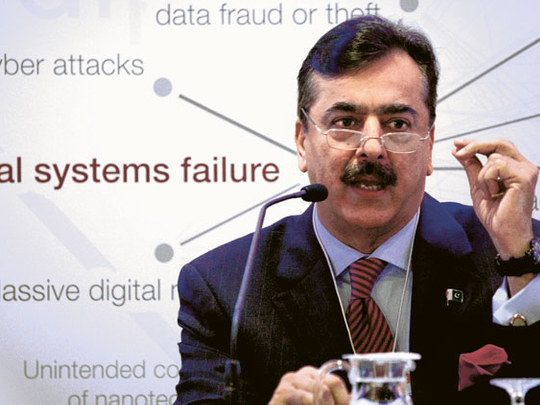
Davos: The euro crisis is likely to result in a split in the single currency, a panel of European CEOs and economists have said.
But during a lively panel discussion at the Davos summit in Switzerland, they also said that there is great confidence that the euro and the majority of its member states will get through the crisis in the end.
Despite the shared conclusion, the panel also shared a deep uncertainty about how politicians will manage the crisis, making any short term predictions very uncertain.
"We need a two speed euro, but getting there has to be done in a realistic time frame," said Gerard Lyons, Chief Economist at Standard Chartered.
"The markets now expect either of two things to happen: the euro will have to move to operate under one treasury, and one or more nations might leave the euro. I think both might happen."
Lyons added that the current structure of the euro is fundamentally flawed in that member states were let in for political reasons, and the core states did not recognise the importance of transfers from the stronger areas to the weaker areas.
Political will
But Lyons recognised the political will to get it right. This was echoed by Pierre Debec, CEO of Deutsche Bank, who said "we will pull back from the cliff, even if we have a bumpy two years," even as he criticised the whole rescue package as being far too slow.
He argued that "a political solution and a Euro-bond issue could have happened a lot earlier, but now we have 16 independent states which have to come together as a political union in order to solve the euro problem".
This optimism was attacked from the audience when Martin Wolf of the Financial Times said there was not hope of solving the problem without a shared diagnosis of the problem, which he has not seen. "The Germans have not offered a solution other than everyone has to act like Germany," he said
America will do very little to help the struggling Europeans. Obama is facing an election year and rescuing the euro is not on his radar screen, said Mark Penn, former adviser to Bill Clinton and Tony Blair. "When asked about any action the United States was going to take, the president simply replied that ‘our oldest alliances are as strong as ever', and made no further comment", said Penn.
Robust view
Martin Witteg of Roland Berger took a much more robust view, when he pointed out that many countries in Europe and the greater European area do not have problems.
He pointed to the econ-omic successes going on in Scandanavia, Poland, the Baltic states, and Turkey. "Nearly half of Europe is doing very well."
The emerging agreement on the panel that a split was all too likely was then attacked by Lord Mandelson who was sitting in the audience.
The former Labour minister and European Commissioner argued passionately that no one should write off the euro too soon. "We need governments and institutions to instill confidence. We cannot be so relaxed about the euro failing since the banking and corporate defaults would cause huge damage across Europe and further afield.
Cameron upbeat on Europe recovery
Despite the uncertainty sweeping across the European Union, British Prime Minister David Cameron was bullish about the prospects for resolving the Eurozone crisis. "Europe could recover its dynamism. I still believe we can. But only if we are bold. Only if we fight for our prosperity ... [and if we] get to grips with the debt," he said.
The Prime Minister called for bold decisions on deregulation, on opening up the Single Market, on innovation and trade, and to address the "fundamental issues" at the heart of the Eurozone crisis. "All of these decisions lie in our own hands. They are the test of Europe's leaders in the months ahead. ... The problems we face are man-made and with bold action and real political will we can fix them," the Prime Minister urged.
Short-term issues must be dealt with. "Greece, banks and the firewall. If you do all those three things together quickly, you would ease the sense of the crisis. For 2012, that would make a clear difference," he advised.
Cameron's remarks came on the heels of pressure from the International Monetary Fund on Monday to "bolster the firewall" around Italy and Spain as talks between Greece and its creditors have been mired in deadlock.
Cameron outlined the features common to all successful currency unions: a central bank that can comprehensively stand behind the currency and the financial system; the deepest possible economic integration with the flexibility to deal with economic shocks, and a system of fiscal transfers and collective debt issuance that can deal with the tensions and imbalances between different countries and regions within the union.
"Currently it's not that the Eurozone doesn't have all of these…it's that it doesn't really have any of these," he declared.
The Eurozone crisis calls for "tough fiscal discipline", but the Prime Minister said that this is a problem of trade deficits, not just budget deficits. "It means countries with those deficits making painful decisions to raise productivity and drive down costs year after year to regain their competitiveness," he said.
"That does not happen overnight and it can have painful economic and even political consequences. Nor is it sufficient. You need the support of single currency partners and ... a system of fiscal integration and risk sharing, perhaps through the creation of euro area bonds to make that support work."
Despite Britain's refusal to sign an EU treaty to change the way the single market is regulated, Cameron said Britain is not walking away from Europe.











